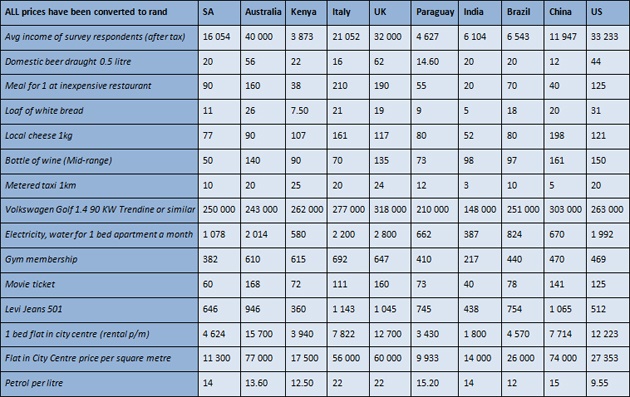Cape Town - Whenever South Africans are told they should save more, the high cost of living is blamed for failing to do this. But is living in SA really that expensive?
Mention the word ‘savings’ and a flurry of comments on how difficult it is to do that when everything is so expensive is sure to follow. The following is a perfect example from Fin24 user Andre Human: "How the hell must one save when petrol, electricity, rates and taxes, Sanral, ect. ect. ect. go up monthly. Eskom asked for 25% increase (in tariffs) and my salary increases by 6% if I am lucky. Prices increase on a daily basis at supermarkets. I would love to save but am unable to do so due to this government fleecing us to the extreme."
And yes, anyone who has been to the supermarket and the petrol station recently will agree that life is expensive in SA and that salaries have not kept pace with rampant price increases in electricity, food and petrol.
Straight comparisons are unfair
And few things make us more livid than when people tell us we actually have it good when compared to other countries. What they usually neglect to say is that one cannot do a straight exchange rate calculation without taking into account what people earn in other countries. Yes, the UK is expensive, but their earnings are also so much higher, so they tend not to feel the pain so intensely.
A site called Numbeo.com provides interesting information by comparing the cost of living in different countries.
Firstly, their salary comparisons are based on the average income of those who responded to the survey (not government stats), which is interesting, as it compares the income of people who have access to the internet (and presumably a comparable level of education and employment from country to country).
Secondly, this puts into perspective what things cost in a particular country as it is seen against the reality of localised purchasing power.
The average income in SA
For example, the South Africans who responded to the survey earned an average of just over R16 000 per month after tax – and Australians almost R40 000. So while the cost of a beer in SA (R20) is relative to that of a beer in Australia (R56) when looking at relative income, the price of property is not.
(But it must be remembered that R16 000 is not an average per capita income in SA. Of the people who are working, the average before deductions, according to the Quarterly Employment Survey of Statistics South Africa, was R14 911 in December 2013 – but we have an unemployment rate of 26.4%, which would bring down the per capita income drastically. South Africa also has a huge income gap between the rich and the poor, but for the purposes of this article, the stats provided by the Numbeo survey respondents will be used.)
The average rental in SA for a 1-bedroom apartment in the city centre is R4 624, while the same would cost R15 759 in Australia – almost four times as much, whereas the average Australian salary is only 2.5 times that of the SA respondents to the survey. So Aussie rentals are high. But then they pay more or less the same for petrol as we do – making ours very costly in comparison.
Of course, with the weak rand, everything is expensive when you are travelling to a country whose currency is strong.
But take a look at the table below (prices have been rounded off) to see what the relative income and the relative cost of specific items are in rand terms in the countries mentioned below:
A few observations
A couple of trends emerge: the lower the average income of a country, the lower the prices of necessities such as food, accommodation and electricity. But in the low-income countries, luxuries, such as new cars or imported goods, come at a very high price.
It is essential to see the above statistics against the background of the differing incomes listed for various countries. While it might look really cheap to live in India, and really expensive to live in the US, once seen as relative to what people earn who live there, the picture changes.
One of the biggest cost differences is in the cost per square metre of buying property. Where population density is high, the costs are out of reach for normal salary earners.
Where things are definitely tough for consumers in South Africa – and getting tougher – it might make us feel better to realise that we are not the only ones in the world battling high living costs. And while our electricity costs are high, our wine and beer are cheap, as are our property prices per square metre.
So all is not lost.
* Susan Erasmus is a freelance writer.
Consider yourself a savings hero? Or just have something on your mind? Add your voice to our Savings Issue:
* Write a guest post
* Share a personal story
* Ask the experts




 Publications
Publications
 Partners
Partners












